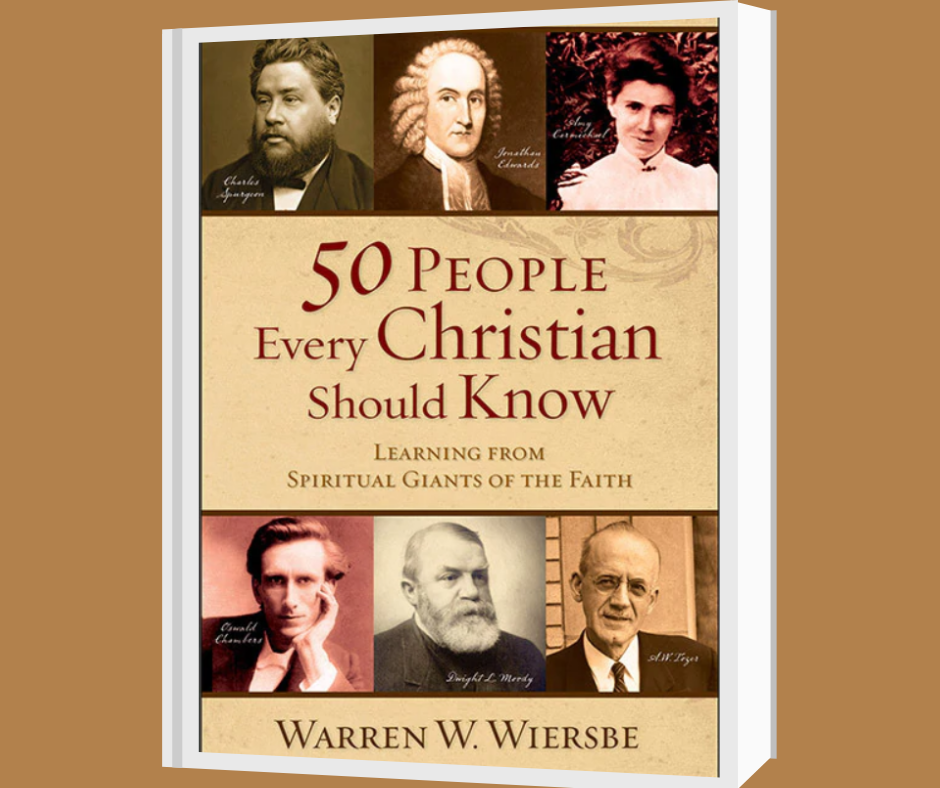Book Reviews
Fifty People Every Christian Should Know by Warren Wiersbe | Review by Rosa Byler
Fifty People Every Christian Should Know: Learning From the Giants of the Faith, by Warren Wiersbe

Every nation has its heroes: ordinary men who attained fame through deeds of strength, bravery, or self-sacrifice for their country. History books describe their lives and exploits in detail with the aim of inspiring young people to similar achievements. The sheer concentration of such stories within the pages of one book tends to increase their effect almost exponentially.
Likewise, the kingdom of God has its great men, and their biographies have comparable motivating force. However, after reading the profile of one such faithful soldier, we are not generally inclined to seek out more in rapid succession. This somewhat dilutes their impact, and we soon forget. Collections of short accounts, presented in chronological order, are one very helpful way of educating us about champions whose contributions had eternal value!
Warren Wiersbe has put together a book of brief sketches of fifty Christians, many of them preachers, who made a significant difference in their immediate or larger environment. (Originally written as monthly articles for two different Christian periodicals, these were later published under two titles: Living With the Giants and Victorious Christians You Should Know.) Not only did Wiersbe thoroughly research the lives of these men (and three women), he also familiarized himself with their written work or compilations of sermons.
As with other heroes, “great” Christians tend to be portrayed as unrealistically virtuous and a bit out of the ordinary. This is not the case in Wiersbe’s book. His characters are Christians who had predictable, average difficulties as well as personal quirks and peculiarities. They struggled with the same sorts of temptations that we do. We do not always agree on Scriptural solutions, and neither did they. (Spurgeon, when reproved for his cigar smoking, replied that he would stop if convicted of smoking to excess. Pressed to define “excess,” he replied that it would be smoking two cigars at once.) Wiersbe treats his characters with respect, but is not opposed to including humor. (Samuel Chadwick, a Methodist college principal, was approached by a student wanting a special dispensation to smoke, as he said he would die if he could not. “Then sit down in that chair and die!” said Chadwick; but the young man ended up on his knees beside the principal and was freed from the habit.)
In addition to the distinguished Christians you would expect to find in such a work, you will meet some lesser-known figures: Alexander Maclaren, to whom preparing a sermon was such serious work that he wore his outdoor boots—never slippers; F.W. Robertson, who memorized Scripture while shaving and managed to commit much of the New Testament to memory; the blind preacher George Matheson, who each week memorized the words of his sermon, the text, and the hymns for the service; W.H. Griffith Thomas, who depended on prayer to such an extent that his church held six prayer meetings per week; and Frank Boreham, who read at least one book a week and took notes on his reading. (He valued his notes and manuscripts so much that when he went on vacation, he buried them in the back yard in case the house should burn down while he was gone.)
Not the least of this book’s benefits is its numerous suggestions for further reading. Wiersbe gives titles and brief recommendations, not only for the works of the characters themselves, but sources for further reading about them. For those who wish to enlarge their libraries, some excellent material is described. (If you belong to the category of those whose libraries should probably not be enlarged, prepare yourself to exercise self-discipline or have a yard sale. Wiersbe’s enthusiasm is contagious.) The book is well-written and easy to read aloud.